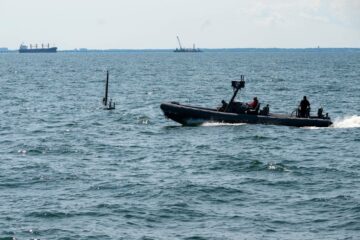
PARIS — The French government has threatened local defense firms with measures including requisitioning and order prioritization to accelerate the production of missiles and artillery shells.
Armed Forces Minister Sébastien Lecornu said he may force firms to put defense orders before civilian ones in coming weeks if manufacturing doesn’t speed up, especially for MBDA’s Aster air-defense missile.
“For the first time, I’m not ruling out using what the law allows the minister and the general directorate for armament to do, which is, if things wouldn’t be going according to plan in terms of production rates and lead times, to requisition or invoke the right of prioritization if necessary,” Lecornu said at a March 26 press conference here.
France has called for its defense industry to adopt a “war economy” footing following Russia’s full-scale invasion of Ukraine, and Lecornu has chided MBDA for the time to deliver the Aster missile, fired by the ground-based SAMP/T air-defense system as well as French, Italian and British warships. The pan-European missile maker has announced plans to cut the delay between an Aster order and delivery to 18 months by 2026, from 42 months before 2022.
Asking MBDA subcontractors to prioritize military over civilian orders to boost Aster output “is obviously something we can’t ignore,” Lecornu said. The government is pressuring defense firms to shorten delivery times for anything from MMP anti-tank missiles to 155mm shells for the Caesar howitzer.
France’s 2023 military-budget law includes the possibility to requisition, prioritize public-interest orders and ask manufacturers to hold minimum levels of critical supplies. Requisitioning is not the preferred tool “at the moment,” though stocks requirements are potentially on the table, the minister said.
“It’s clear that if production rates are sometimes too slow, it’s because there’s a temptation to work just-in-time and not have enough stocks of raw materials or components,” Lecornu said.
The European Union’s executive branch earlier this month proposed allowing priority purchasing of civilian and military equipment in case of supply or security crises, as part of its European Defence Industry Programme.
French defense firms need to produce more and faster, to aid Ukraine but also to secure export contracts, which are key to maintaining France’s defense-industrial model, Lecornu said. France missed out on “a few contracts,” particularly in Eastern Europe, because delivery times were worse than what competitors could offer, according to the minister.
“It’s also a wakeup call for all of use to understand that we now have customers who are in a hurry,” Lecornu said.
Still, the minister said things are moving in the right direction, with KNDS Nexter doing “a great job” together with explosives manufacturer Eurenco to boost production of 155mm artillery shells.
Nexter has invested in machinery and has plans to add more, Emmanuel Chiva, head of French armament agency DGA, said at the press conference. He said France aims to move “very quickly” in producing 40,000 155mm shells a year, then “very rapidly” to 100,000 to 150,000 shells a year.
The target is 100,000 shells in 2024, including 80,000 for Ukraine and 20,000 for the French Army, according to Lecornu, compared with 30,000 delivered to Ukraine since the start of the war. The minister said black powder is the main bottleneck, and France is locating sources of powder, for example through recycling older munitions.
France plans to double output of Safran’s AASM Hammer guided bombs to 1,200 in 2025. The country in February started supplying Ukraine with 50 of the munitions per month. Talks are due to start with allies to adapt the bombs to the U.S.-made F-16 ahead of delivery of the aircraft to Ukraine, Lecornu said.
The ministry has asked MBDA to deliver 40 Scalp air-launched cruise missiles, which have been supplied to Ukraine for long-range strikes.
French Navy frigates have fired 22 Aster missiles against Houthi drones and ballistic missiles since they deployed to the Red Sea, according to Lecornu, who said stocks are “correct” but he doesn’t want to take risks. France operates the SAMP/T for national defense, with plans to deploy the system during the Paris Olympic Games in July and August, while the system is also deployed in Romania. A donated SAMP/T system defends the Kyiv area.
France plans to double an order for long-range Aster missiles to 400, for a total value of nearly €2 billion, or $2.2 billion. MBDA had planned to deliver the first missiles in 2026, and the ministry is now asking for deliveries to start in the second half of 2024, according to data presented at the press conference.
Lecornu said President Emmanuel Macron has asked him to prepare a new military-aid package for Ukraine.
The French Army is receiving Jaguar armored fighting vehicles and Griffon armored personal carriers to replace AMX-10 RC and VAB vehicles, and “it’s clear that for the next aid packages for Ukraine, the outflow of equipment from our armies will go almost entirely to Ukraine,” the minister said. The DGA received 22 Jaguar IFVs and 123 Griffon APCs in 2023.
France had at least €34 billion of outstanding orders with French defense firms at the end of 2023, according to data presented by Lecornu.
| Supplier | Value of outstanding orders as of Dec. 31 2023 |
|---|---|
| Thales | €6 billion |
| Airbus Defence & Space | €5 billion |
| Airbus Helicopters | €5 billion |
| Dassault Aviation | €5 billion |
| Naval Group | €4 billion |
| MBDA | €3 billion |
| Safran | €2 billion |
| KNDS Nexter | €1.5 billion |
| Naval industry excl. Naval Group | €1.5 billion |
| Arquus | €1 billion |
Source: French Armed Forces Ministry. Numbers are rounded.
Rudy Ruitenberg is a Europe correspondent for Defense News. He started his career at Bloomberg News and has experience reporting on technology, commodity markets and politics.
- SEO Powered Content & PR Distribution. Get Amplified Today.
- PlatoData.Network Vertical Generative Ai. Empower Yourself. Access Here.
- PlatoAiStream. Web3 Intelligence. Knowledge Amplified. Access Here.
- PlatoESG. Carbon, CleanTech, Energy, Environment, Solar, Waste Management. Access Here.
- PlatoHealth. Biotech and Clinical Trials Intelligence. Access Here.
- Source: https://www.defensenews.com/global/europe/2024/03/27/france-threatens-to-strong-arm-industry-to-boost-missile-output/
- :has
- :is
- :not
- $UP
- 000
- 1
- 100
- 150
- 2%
- 20
- 200
- 2022
- 2023
- 2024
- 2025
- 2026
- 22
- 26
- 30
- 31
- 40
- 400
- 42
- 5
- 50
- 70
- 8
- 80
- a
- accelerate
- According
- adapt
- add
- adopt
- against
- agency
- ahead
- Aid
- aims
- aircraft
- All
- Allowing
- allows
- almost
- also
- an
- and
- anything
- ARE
- AREA
- armed
- Army
- AS
- ask
- asked
- asking
- At
- AUGUST
- BE
- because
- been
- before
- between
- Billion
- Black
- Bloomberg
- boost
- bottleneck
- Branch
- British
- but
- by
- call
- called
- Career
- carriers
- case
- civilian
- clear
- Column
- coming
- coming weeks
- commodity
- compared
- competitors
- components
- Conference
- content
- contracts
- could
- country
- crises
- critical
- cruise
- Customers
- Cut
- data
- defence
- Defense
- delay
- deliver
- delivered
- Deliveries
- delivery
- deploy
- deployed
- direction
- do
- Doesn’t
- doing
- donated
- double
- Drones
- due
- during
- Earlier
- eastern
- eastern europe
- Emmanuel Macron
- end
- enough
- entirely
- equipment
- especially
- Ether (ETH)
- Europe
- European
- example
- executive
- experience
- export
- faster
- February
- few
- fighting
- fired
- firms
- First
- first time
- following
- For
- Force
- Forces
- France
- French
- from
- full-scale
- Games
- General
- Go
- going
- Government
- great
- guided
- had
- Half
- hammer
- Have
- he
- head
- here
- him
- his
- hold
- HTTPS
- if
- ignore
- images
- in
- Including
- industry
- invasion
- invested
- Italian
- ITS
- jaguar
- jpg
- July
- Key
- Law
- lead
- least
- levels
- local
- locating
- machinery
- Main
- maintaining
- maker
- Manufacturer
- Manufacturers
- manufacturing
- March
- Markets
- materials
- May..
- measures
- Military
- minimum
- minister
- ministry
- missed
- missiles
- model
- moment
- Month
- months
- more
- move
- moving
- National
- nearly
- necessary
- Need
- New
- news
- next
- now
- numbers
- of
- offer
- older
- Olympic
- Olympic Games
- on
- ones
- operates
- or
- order
- orders
- our
- out
- output
- outstanding
- over
- package
- packages
- paris
- part
- particularly
- per
- personal
- plan
- planned
- plans
- plato
- Plato Data Intelligence
- PlatoData
- politics
- potentially
- preferred
- Prepare
- presented
- president
- press
- prioritization
- Prioritize
- priority
- produce
- producing
- Production
- proposed
- purchasing
- put
- Rates
- Raw
- received
- receiving
- recycling
- Red
- replace
- Reporting
- Requirements
- right
- risks
- Romania
- ruling
- s
- Said
- SEA
- Second
- secure
- security
- see
- since
- slow
- something
- sometimes
- Sources
- speed
- start
- started
- Stocks
- Strikes
- subcontractors
- supplied
- supplies
- supply
- supplying
- system
- table
- Take
- Talks
- Target
- Technology
- terms
- than
- that
- The
- the Law
- then
- they
- things
- this
- though?
- threatens
- Through
- time
- times
- to
- together
- too
- tool
- Total
- Ukraine
- understand
- use
- using
- value
- Vehicles
- want
- war
- we
- Weeks
- WELL
- were
- What
- which
- while
- WHO
- will
- with
- Work
- worse
- year
- zephyrnet












